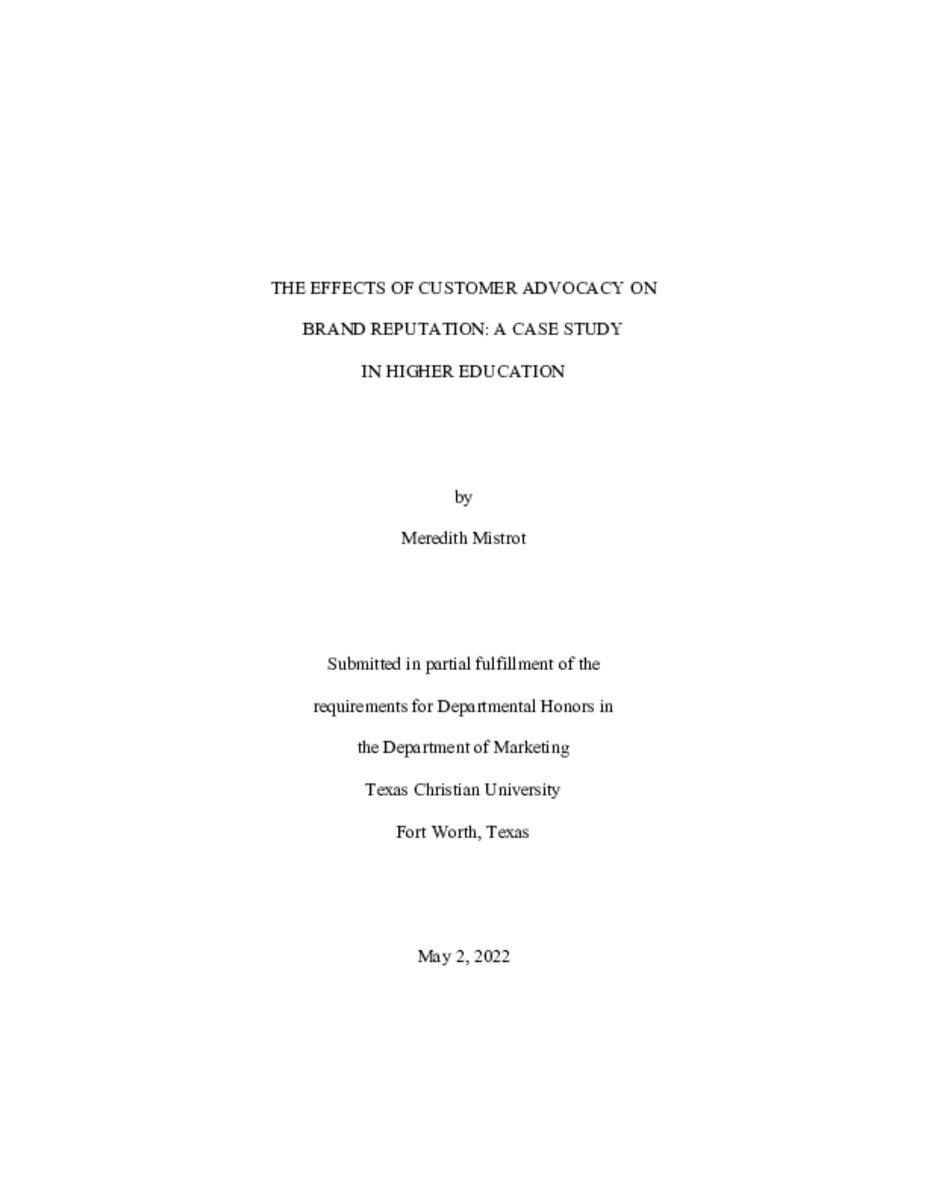The Effects of Customer Advocacy on Brand Reputation: A Case Study in Higher EducationShow full item record
| Title | The Effects of Customer Advocacy on Brand Reputation: A Case Study in Higher Education |
|---|---|
| Author | Mistrot, Meredith |
| Date | 2022 |
| Abstract | The purpose of this study is to understand the relationship between customer advocacy and brand reputation in a non-profit context, specifically using Texas Christian University (TCU) as a case study. Customer advocacy is defined as the passionate endorsement of a company's products or services, typically in a forceful nature that implicitly defends an organization from its competitors. The creation of customer advocacy has long been viewed as a goal of the customer journey, for strong customer advocacy is linked to continued participation by a company's current customers as well as improved recruitment of new customers. Brand reputation, made up of customers' general attitudes about a brand, is another influential factor in a company's success but has not been heavily studied in conjunction with customer advocacy. Additionally, customer advocacy has not been heavily studied in a nonprofit context. This study aimed to bring awareness to the relationship between advocacy and reputation, the most influential drivers of advocacy, and differences in advocacy based on demographics. To achieve these objectives, a convenience sample of 103 undergraduate students attending TCU was surveyed. Holistic measures of advocacy and reputation were created from adapted scales and were compared using factor analysis and a linear regression. Results showed that there is a moderately positive relationship between advocacy and perceived reputation at the university, whereby increased student advocacy leads to an increase in students' perceived reputation of their university. Additionally, social media influencers are significantly influential in forming student attitudes. Finally, demographical information supplied by respondents indicated that there is an unequal distribution of the university's advocates across race, college of enrollment, and involvement in the university. Overall, the positive relationship between advocacy and reputation emphasizes the importance of forming and maintaining a strong advocate base to enhance the university's reputation. Social media influencers can be used at the forefront of the university's marketing strategy to improve the likelihood of student advocacy and thereby perceived reputation. The variation in the propensity to advocate based on demographics implies the need to shift marketing efforts toward those who have historically been less likely to advocate. The major limitation of this study was the sample used; the largely homogenous convenience sample of TCU students could be expanded and diversified to improve the accuracy of the findings herein. Specifically, students across TCU's colleges and classifications, as well as students from other universities, could be surveyed to understand if these relationships continue to exist in a larger, more diverse sample. |
| Link | https://repository.tcu.edu/handle/116099117/54188 |
| Department | Marketing |
| Advisor | Kleiser, Susan |
| Additional Date(s) | 5/19/2022 |
Files in this item
This item appears in the following Collection(s)
- Undergraduate Honors Papers [1362]
© TCU Library 2015 | Contact Special Collections |
HTML Sitemap



